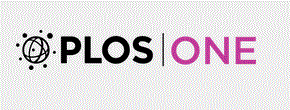 Today saw the publication of a new paper from an international research team from the UK, Japan and Nepal. Our research article ‘Assessing knowledge and behavioural changes on maternal and newborn health among mothers following post-earthquake health promotion in Nepal’ has been published in the Open Access journal PLoS ONE [1].
Today saw the publication of a new paper from an international research team from the UK, Japan and Nepal. Our research article ‘Assessing knowledge and behavioural changes on maternal and newborn health among mothers following post-earthquake health promotion in Nepal’ has been published in the Open Access journal PLoS ONE [1].
The paper reminds us that natural disasters often disrupt health systems affecting the whole population, but especially vulnerable people such as pregnant women, new mothers and their babies. Despite the global progress in maternal, newborn and child health (MNCH) programmes over the years, emergency responses after a disaster are often poor. Post-disaster health promotion could play an important role in improving MNCH outcomes. However, evidence remains limited on the effect of post disaster health promotion activities in low-income countries such as Nepal.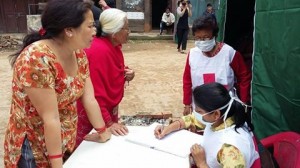
The paper reports on an post-disaster intervention study aimed at women in Nepal following the 2015 earthquake. In total, 364 mothers were recruited in the pre-intervention group and 377 in the post-intervention group. The post-intervention group was more likely to have knowledge of at least three danger signs in pregnancy (AOR [Adjusted Odds Ratio] = 2.96, P<0.001), at least three danger signs in childbirth (AOR = 3.8, P<0.001), and at least five danger signs in newborns (AOR = 1.56, P<0.001) compared to the pre-intervention group. The mothers in the post-intervention group were also more likely to ever attend ANC (AOR = 7.18, P<0.001), attend a minimum of four ANC sessions (AOR = 5.09, P<0.001), and have institutional deliveries (AOR = 2.56, P<0.001).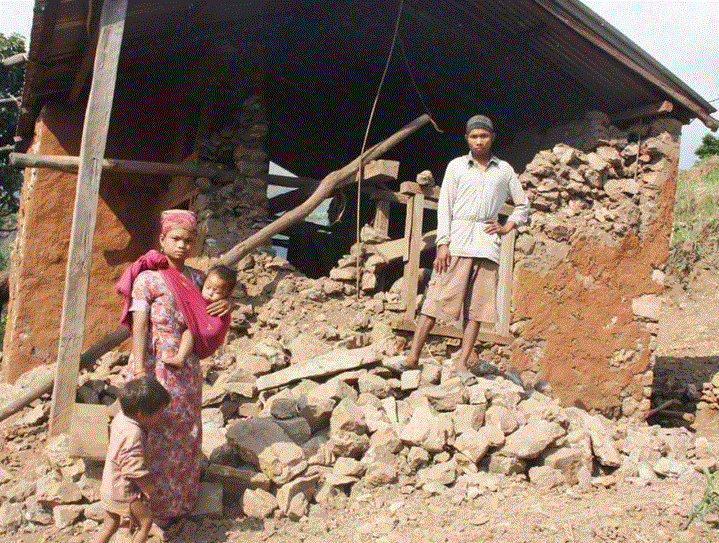
Religious minority groups were less likely to have knowledge of all danger signs compared to the majority Hindu group. Mothers from poorer households were also less likely to attend four ANC sessions. Mothers with higher education were more likely to have knowledge of all the danger signs. Mothers whose husbands had achieved higher education were also more likely to have knowledge of danger signs and have institutional deliveries. The paper concludes that the health promotion intervention helped the disaster-affected mothers in improving the knowledge and behaviours related to MNCH. However, the authors also comment that vulnerable populations need more support to benefit from such intervention.
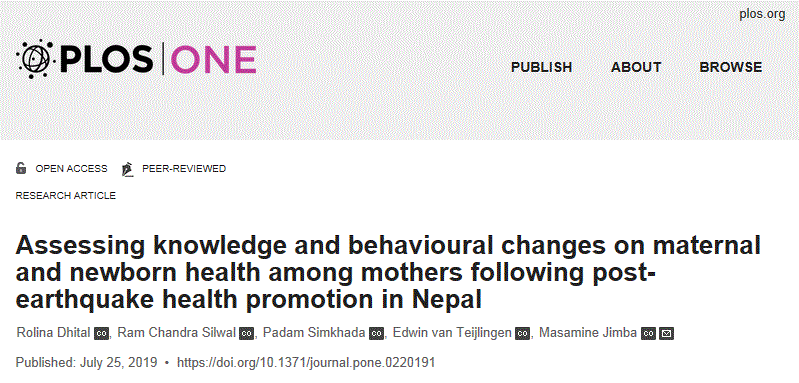
Reference:
Dhital R, Silwal RC, Simkhada P, van Teijlingen E, Jimba M (2019) Assessing knowledge and behavioural changes on maternal and newborn health among mothers following post-earthquake health promotion in Nepal. PLoS ONE 14(7): e0220191. https://doi.org/10.1371/journal.pone.0220191
 New CMMPH publication on maternity care in Nepal
New CMMPH publication on maternity care in Nepal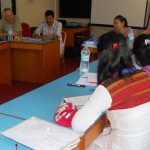 Health Promotion intervention planning in rural Nepal
Health Promotion intervention planning in rural Nepal










 BU attendance at third annual GCPHR meeting in June
BU attendance at third annual GCPHR meeting in June Interactive Tangible and Intangible Heritage Applications – BU student work featured in new book chapter
Interactive Tangible and Intangible Heritage Applications – BU student work featured in new book chapter Second NIHR MIHERC meeting in Bournemouth this week
Second NIHR MIHERC meeting in Bournemouth this week MSCA Postdoctoral Fellowships 2025 Call
MSCA Postdoctoral Fellowships 2025 Call ERC Advanced Grant 2025 Webinar
ERC Advanced Grant 2025 Webinar Horizon Europe Work Programme 2025 Published
Horizon Europe Work Programme 2025 Published Horizon Europe 2025 Work Programme pre-Published
Horizon Europe 2025 Work Programme pre-Published Update on UKRO services
Update on UKRO services European research project exploring use of ‘virtual twins’ to better manage metabolic associated fatty liver disease
European research project exploring use of ‘virtual twins’ to better manage metabolic associated fatty liver disease